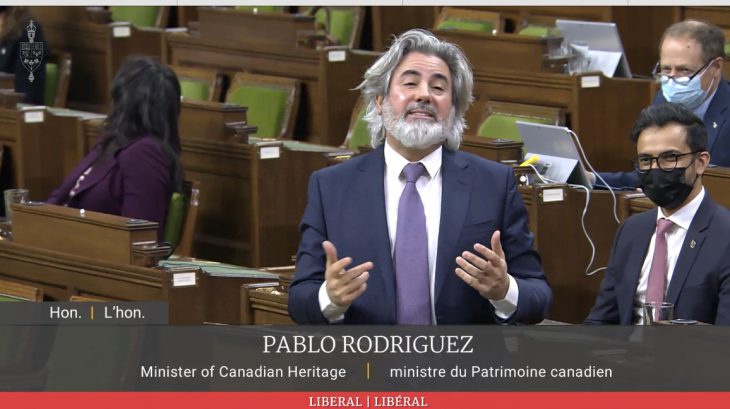
By Denis Carmel
OTTAWA – Although Bill C-11, the Online Streaming Act, was introduced on Feb. 2, it had not yet been debated in the House of Commons – that is how the House works.
The first debate happens at the second reading, which happened today.
The tone of the exchanges and the positions of different party representatives can give us a sense of where this bill is going and whether we will repeat the parliamentary process of C-10, the previous version of the legislation to update the Broadcasting Act, that led to the demise of the bill even if the government was able to limit the debate.
First, Minister of Canadian Heritage Pablo Rodriguez (above), was good at presenting his bill without being caustic toward opposition parties, which did hamper the discussion of Bill C-10.
It also became clear the NDP and the Bloc Québécois would be supporting Bill C-11 just like they did for Bill C-10.
The real question was, of course, the position of the Conservatives. Things started on shaky ground with the first intervenor, Pierre Poilievre, saying this bill was to control what Canadians watch.
But then came the Conservative critic, John Nater who spoke in French, which clearly surprised some. Nater said the Conservatives, as per their electoral platform, would support requiring the “large foreign streamers pay their fair share.”
But there are still concerns about the exclusion of user-generated content and especially Section 4.2, which the Conservatives believe does not clearly exempt user-generated content because of confusing language in the legislation. They are also worried about the unfettered powers given to the CRTC.
Therefore, the Conservatives will not support the bill in second reading, Nater said, but will propose amendments in Committee and they are hoping that the government will not restrict the debates.
A vote is to be held at a later date, but since the House will be only sitting one week in the next four weeks, and the debate on the Emergencies Act will likely take precedence, it might take a while.
The bill will then be sent to the Committee on Canadian Heritage, which will likely hear witnesses and study amendments. With the budget, the debates on which will take priority, rumored to be coming out in April, we might see passage in late June if the government stickhandles it well. It is more likely, however, to be in the fall seeing as there is potential for the Conservatives to stall its adoption unless they get what they want, which they might not be very clear on.


